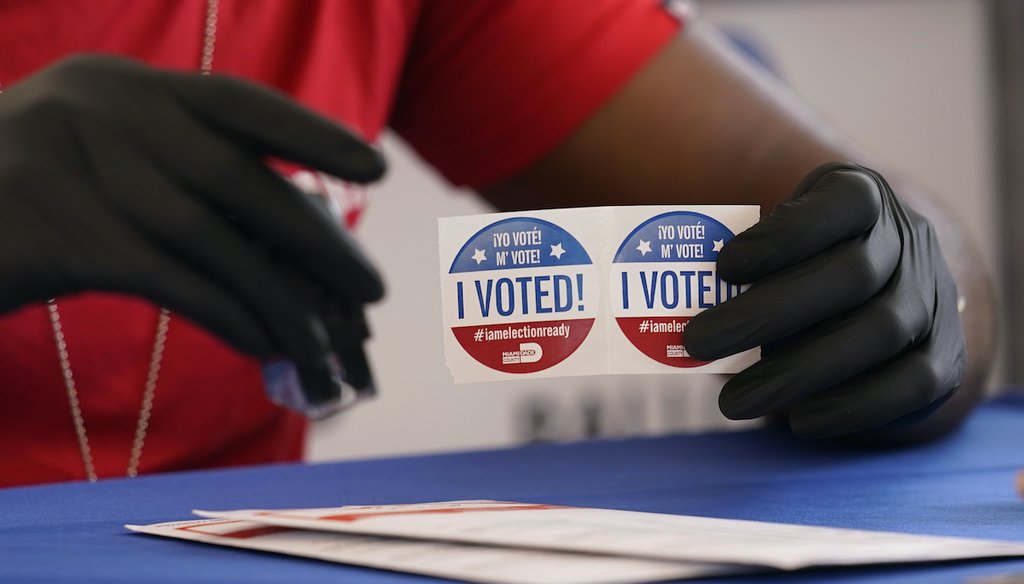Stand up for the facts!
Our only agenda is to publish the truth so you can be an informed participant in democracy.
We need your help.
I would like to contribute

An election worker holds "I Voted" stickers as people drop off vote-by-mail ballots for the Nov. 3 general election at the Miami-Dade County Elections Department, Wednesday, Oct. 14, 2020, in Doral, Fla. (AP)
If Your Time is short
-
After a presidential election that state officials said was smooth and a model for the nation, Florida Republicans sought to rewrite the state’s election laws.
-
The Legislature passed SB 90 along party lines in April, and Gov. Ron DeSantis signed the bill into law May 6. It took effect immediately.
-
The bill restricts ballot drop boxes, bans the collection by individuals of multiple completed ballots and adds requirements to request a mail ballot.
A series of states have passed restrictive voting laws recently in the wake of Donald Trump’s loss. While Texas Democrats walked out to prevent passage of a bill there, the new voting law in Florida passed easily with Republican support in late April.
While Florida’s election officials and statewide leaders praised the November election as smooth and a model for the nation, Republicans rewrote Florida’s election laws anyway.
"We’re not resting on our laurels, and me signing this bill here says, ‘Florida, your vote counts,’" Gov. Ron DeSantis told the hosts of "Fox & Friends" May 6 when he signed Senate Bill 90 at an event where Florida reporters were barred. "Your vote is going to be cast with integrity and transparency, and this is a great place for democracy."
The Florida law isn’t as expansive as Georgia’s SB 202, which led to corporate backlash and cost Atlanta the chance to host baseball’s All-Star Game. But it will change some of the rules for voting in the nation’s largest battleground state.
Florida’s statewide association of election supervisors, which includes Republicans and Democrats, criticized the legislation. The new restrictions have prompted multiple lawsuits by voting rights and civil rights groups, including the League of Women Voters and the NAACP. National Republican groups who support the law have sought to intervene in one lawsuit.
"SB 90 is a bill that purports to solve problems that do not exist, caters to a dangerous lie about the 2020 election that threatens our most basic democratic values, and, in the end, makes it harder to vote without adequate justification for doing so," wrote the plaintiffs in the suit filed by lawyer Marc Elias on behalf of the League of Women Voters. Elias has filed multiple election law challenges nationwide.
The new law leaves some key voting rights in Florida unchanged, such as allowing voters to cast a ballot by mail without an excuse and keeping at least eight days of early voting. But it restricts other aspects of voting, especially voting by mail, following an election in which Democrats cast more mail ballots than Republicans, a reversal of past trends.
The law has multiple technical and administrative changes for elections officials. Here are some of the key changes.
Requests for mail ballots won’t last as long as in the past. Instead of being able to request a ballot through the next two general elections — the next four years — voters are limited to requesting ballots only through the next general election, or two years. However, current requests are grandfathered in.
The new law also prohibits election officials from mailing ballots to a voter unless it’s requested. That provision is an attempt to prevent what officials in some other states did to mail ballots to all voters due to the pandemic.
Floridians requesting a mail ballot in person or over the telephone must provide their driver’s license number, a state-issued ID number or the last four digits of their Social Security number, whichever may be verified in the supervisor’s records. Those requesting a mail ballot in writing must provide the same identification and sign their request.
The new rules have raised questions for election supervisors such as how to handle mail ballot requests from voters who registered so long ago that they registered without such identifications. Election officials are expected to discuss these types of issues at their 2021 summer conference in Tampa.
The law aims to crack down on the practice critics call "ballot harvesting," which involves political operatives collecting voters’ completed mail-in ballots and turning them in. That practice has already been illegal in Miami-Dade County for many years.
The law limits a person to possessing two ballots other than their own, except for immediate family members.
Republicans removed the harvesting ban in 2001. A 2012 statewide grand jury urged lawmakers to ban it again following voter fraud cases in Miami, but that was generally ignored until this year following Trump’s repeated assertions about voter fraud.
Florida does not have a pattern of widespread voter fraud, but people have been sporadically charged. The 1997 Miami mayor’s race was overturned after 55 people, including a Miami city commissioner and his chief of staff, were charged with voter fraud for manipulating mail-in ballots.
Florida already banned solicitation of voters within a certain distance of polling sites, but the new law expands the ban to include zones around drop boxes and to include "engaging in any activity with the intent to influence or effect of influencing a voter."
That doesn’t go as far as Georgia’s law, which expressly bans handing out food or water to voters in line, but critics say the Florida provision could be interpreted to prevent such "line warming" activities by groups.
Voting rights advocates have often set up food or water giveaways such as Pizza to the Polls in urban areas known for long voting lines.
About 1.5 million Floridians used drop boxes during the 2020 general election rather than relying on the mail or facing indoor crowds during the pandemic.
Except for secure drop boxes at the election supervisor’s office, the new law says a box may be used only during a county’s early voting hours. That provision means some voters can’t use drop boxes for the very reason they’d want to: to drop off a ballot at night.
The law also requires all drop boxes to be monitored in person by an employee of the supervisor, an added expense for taxpayer-funded election offices. The bill creates a civil penalty of $25,000 for a supervisor who leaves a drop box open outside of early voting hours.
The impact of this provision will vary from county to county. The law doesn’t change procedures in counties such as Miami-Dade that staffed drop boxes during early voting hours in 2020. But it will be a change for counties that relied on video surveillance rather than staff or offered more hours.
Palm Beach County provided 24/7 access to drop boxes at its four election offices that were watched by sheriff’s office employees — but the new law only allows election workers to watch the boxes. Palm Beach Supervisor of Elections Wendy Sartory Link said she will try to find election staff to work overtime to watch boxes at night and weekends, but there won’t be 24/7 access. The drop box at the main office was very busy in the weeks before Election Day.
"It was constant — never more than 30 seconds without somebody at a drop box, cars coming every day all day long," she said.
RELATED: What’s in Georgia’s new voting law that lost it the All-Star Game
RELATED: Bills in Congress align with Biden’s campaign promise on Voting Rights Act
Our Sources
Florida Senate, SB 90, May 6, 2021
Tampa Bay Times, Gov. Ron DeSantis signs Florida voting bill in front of Trump fan club, May 6, 2021
Tampa Bay Times, Election reforms targeting voting by mail, drop boxes passes Florida Legislature, April 29, 2021
Tampa Bay Times, Florida Senate braces for elections overhaul. But what are the major changes? April 22, 2021
Tampa Bay Times, Trump wins Florida soundly, but the presidential race still up in the air, Nov. 3, 2021
Politico, Florida Legislature approves controversial restrictions on voting, April 29, 2021
WFLA, How Florida’s new election law may affect your vote, May 6, 2021
Sun Sentinel, DeSantis signs controversial new election law making it harder for some Floridians to vote, May 6, 2021
Fox and Friends, Gov. DeSantis signs bill on election integrity and transparency, May 6, 2021
Austin American-Statesman, 'Good trouble': House Democrats walk, killing GOP elections bill, but Abbott vows special session, May 30, 2021
New York Times, Fraud Ruling Invalidates Miami Mayoral Election, March 5, 1998
Democracy Docket, Lawsuits about SB 90, 2021
White House, Statement by President Joe Biden on Texas Senate Bill 7, May 29, 2021
Brennan Center for Justice, Voting Laws Roundup: May 2021, May 28, 2021
Gov. Ron DeSantis, Tweet, Nov. 4, 2021
Telephone interview, Wendy Sartory Link, Palm Beach County supervisor of elections, June 1, 2021
Telephone interview, Consuelo Kelley, Broward Supervisor of Elections spokesperson, June 1, 2021
Email interview, Suzy Trutie, Miami-Dade Supervisor of Elections spokesperson, June 1, 2021
Email interview, Mark Earley, Leon County Supervisor of Elections, June 1, 2021
Email interview, Gerri Kramer, spokesperson for Craig Latimer, Hillsborough County Supervisor of Elections and president of the statewide association of supervisors, June 1, 2021
























